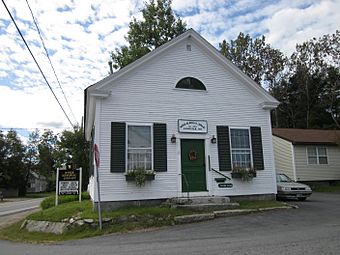Miner Memorial Library facts for kids
|
First Universalist Chapel
|
|
 |
|
| Location | 3 Second New Hampshire Turnpike, Lempster, New Hampshire |
|---|---|
| Area | less than one acre |
| Built | 1845 |
| Architect | Parker, William B. |
| Architectural style | Mid 19th Century Revival |
| NRHP reference No. | 06001130 |
Quick facts for kids Significant dates |
|
| Added to NRHP | December 12, 2006 |
The Miner Memorial Library is a public library in Lempster, New Hampshire. It is located at 3 Second New Hampshire Turnpike. This building was first built in 1845. It was originally a church for a group called the Universalists. Even though it has changed a lot to become a library, it is still a great example of old church buildings in Sullivan County.
The building is also known as the First Universalist Chapel. It was added to the National Register of Historic Places in December 2006. It was also listed on the New Hampshire State Register of Historic Places in January 2006. These lists recognize important historical places.
About the Building and Its Past
The Miner Memorial Library is in the center of East Lempster. You can find it at the corner of New Hampshire Route 10 and the 2nd New Hampshire Turnpike. It is a wooden building with one and a half stories. It has a pointed roof and its outside walls are covered with clapboards.
The building has nice decorations. However, it does not have many details that show a specific building style. One detail is a fan-shaped design on the front gable. This design is typical of the Federal style. The front of the building has three sections. The main door is in the middle. It has simple trim around it with square blocks at the corners.
How the Building Was Used Over Time
The building was built in 1845 for a Universalist church group. This group had likely been active since the 1830s. While the church owned the building, not many changes were made. Some windows were added, and electricity was put in during 1941.
In 1927, the building was officially named to honor Alonzo Ames Miner. He was born in Lempster. Miner was a very important Universalist minister. He also served as the president of Tufts College. By the late 1940s, the church group became very small. They only held services there in the summer. In 1964, the church leaders offered the building to the town.
Images for kids




